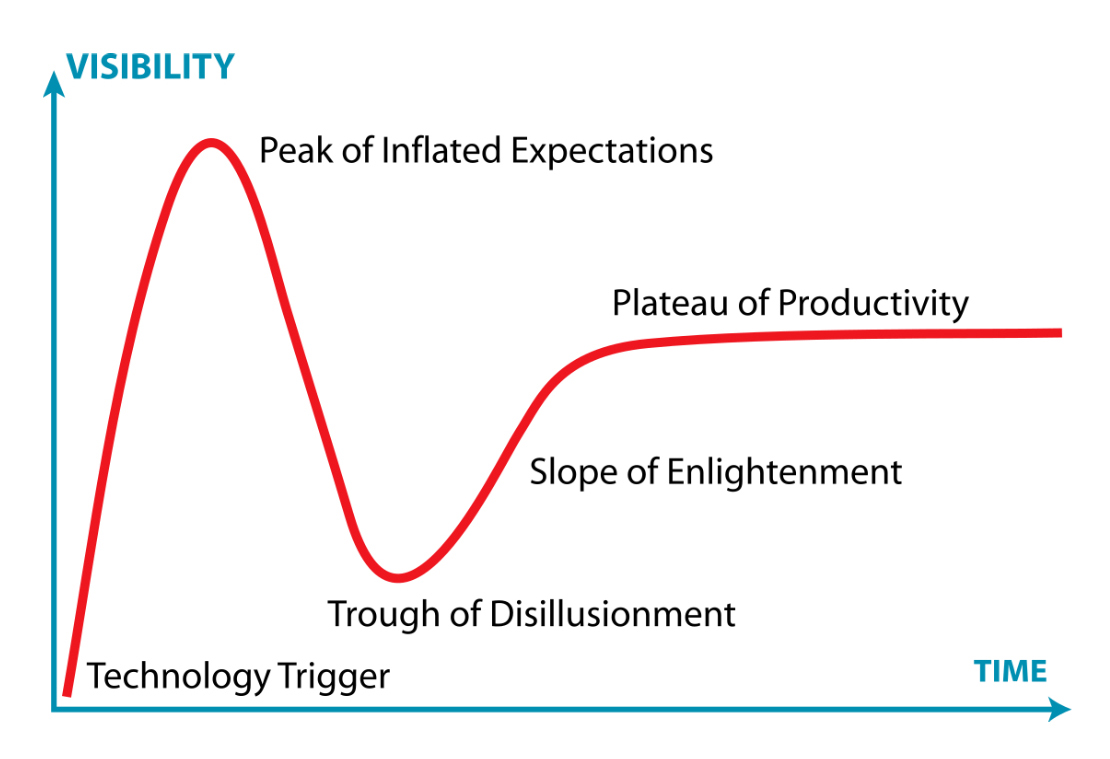The Metaverse is Gone, and the Dream With It


Synopsis
The concept of the Metaverse has generated a lot of buzz and discussion, but it can be challenging to separate fact from fiction in the midst of all the hype. While some predictions may seem far-fetched, there's no denying that the idea of a virtual world has captured the imagination of many. However, the main question stands: is this attention really deserved?
1. The world is in metaverse denial, and no one wants to admit that they were caught up in it.
The popular obsession with the metaverse revolution, fading for more than a year, seems to have winked out, and metaverse whiz kids are consigned to the cultural boneyard. Not more than a year ago, boosters of the virtual economy and their true believers in the press claimed to have changed all the rules, declaring the 2020s the ''m-Decade," and announcing a brave new world. It wasn't enough for them to make money. They had to make history. Now they ARE history. This is the end of the nerd as a crossover hit of the IPO zillionaire as a role model to college students. Having failed to sell their dreams, they are now attempting to sell their failure. College students hoping to emulate Marc Zuckerberg and other geek stars migrated to Silicon Valley with thin résumés and visions of Lamborghinis dancing in their heads. That's all changing. The world is in metaverse denial, and the "metazens" are seen today as scam artists.
2. When will the Metaverse Bubble burst?
That unpleasant popping sound is likely to be heard before the end of this year. Starved for cash, many metaverse companies will try to raise fresh funds by issuing more stock or bonds. But a lot of them will fail. As a result, many cash-strapped metaverse firms are scrambling to find financing: an exclusive study conducted by Pegasus Research International indicates that at least 51 metaverse firms will burn through their cash within the next 12 months. This amounts to a quarter of the 207 companies included in the study.
3. The Metaverse is broken. The evidence is everywhere.
Outages drop millions offline for hours, sometimes days. Virtual worlds take forever to load. Engineers have been predicting the collapse of the Metaverse since before there even was one. There are going to be more outages, and they're going to get worse. The mania for Metaverse had all the ingredients for a roller-coaster ride from boom to bust - glamorous-sounding products that investors knew little about, avarice, an economy firing on all cylinders, some dashing young entrepreneurs, a small army of cheerleaders in brokerage houses and in the media peddling the line that the rules of business had been rewritten. Yet it did not have the ability to rewrite the rules of economics. The iron laws of markets have now reasserted themselves, and reality has now set in. Shares in metaverse start-ups changing hands for hundreds of dollars each at the height of the speculative fever are now virtually worthless.
4. An oversold community
I'm perplexed. It's not that I haven't had a gas of a good time on the Metaverse. I've met great people. But today, I'm uneasy about this most trendy and oversold community. Visionaries speak of virtual town meetings and communities. Commerce and business will shift from eCommerce to virtual worlds.
And the freedom of Web3 and decentralization will make the government more democratic. Baloney! Then there are those pushing VR headsets into schools. We're told that the Metaverse will make schoolwork easy and fun. Students will happily learn from animated characters while taught by expertly tailored software. Who needs teachers when you've got computer-aided education? Bah! These expensive toys are difficult to use in classrooms and require extensive teacher training. And then there's meta business: how come my local mall does more business in an afternoon than the entire Metaverse handles in a month?
5. The Metaverse is missing the most essential ingredient of capitalism: people.
What's missing from this virtual wonderland? Human contact. Discount the fawning techno-burble about virtual communities. The Metaverse isolates us from one another. A meeting in Horizon is a limp substitute for meeting friends over coffee. No interactive multimedia display comes close to the excitement of a live concert. And who'd prefer cybersex to the real thing? A poor substitute is this virtual reality where frustration is legion, and essential aspects of human interactions are relentlessly devalued. Researchers found that millions are already turning their back on the Metaverse, frustrated by its limitations. The growth of the Metaverse will slow drastically, and the truth is that most avatars have nothing to say to each other. By 2030 or so, it will become clear that the Metaverse impact on the economy has been no greater than Google Plus.
Conclusion
Do you agree with the above statements? If so, it's time for me to confess that I've tricked you. I've merely taken articles from the 90s discussing the dot.com bubble and replaced the word "Internet" with "Metaverse." Sorry! Skeptical? Don’t be: you can verify the original sources at the end of the piece (thank me later).
Just an afterthought
Now that I have come clean, I can give you my two cents on the subject. The Metaverse is just the logical evolution of the Internet, pure and simple. The "Rebrand" (not unlike what the famous reality competition television franchise did with Orwell’s 1984… There must be a dystopian pattern I don’t see here!) is just a marketing move, but the technology is far from being revolutionary. It's “Darwin 3.0.” The Metaverse is a term with various interpretations, often driven by commercial or branding goals. For instance, Mark Zuckerberg's Metaverse vision centers on VR, as Meta owns 90% of the VR headset market, while Apple aims to expand the potential of wearables with its highly anticipated Glasses.
Take our industry as an example: we used to book hotels through physical travel agencies (who does remember those?), then transitioned to paper catalogs and brochures, followed by static websites and, eventually, e-Commerce. In the future, we will book through Decentraland or The Sandbox, which is just a change in the "medium," not the "goal." This is true for every aspect of the Metaverse. The evolution of website design serves as a reminder: in the 1990s and early 2000s, websites could only be passively experienced, yet required users to actively "enter" the Internet.
This was done by disconnecting the telephone landline, connecting a 56k modem, and listening to what Alexis C. Madrigal poetically refers to as "the noise of the beginning of the internet" (if you’re over 40, you’re hearing it now in your head as you read this). However, with the advent of wearables, IoT, and the constant connectivity of smartphones, we are always on the Internet and never really have to "enter" it anymore. The Metaverse will likely follow this trend. Currently, accessing the Metaverse requires some level of proactivity, such as putting on a VR headset or AR glasses or using a phone for mixed-reality experiences, but can foresee a future where the Metaverse eventually becomes an afterthought, like our fridges or washing machines, cooling beers and soaping dishes as we Netflix & Chill.
The Metaverse, for real this time
But, to keep this pragmatic, let me end the piece by looking at the Metaverse's possible current (and future) applications in our industry. Here's my personal Top 15:
1 - Improving direct booking UX. Currently, booking on brand.com is often a frustrating experience for guests, with booking engines offering inconsistent and unattractive designs. The Metaverse has an advantage by providing a graphical interface where guests can easily book by (literally) the blink of an eye. Just as hotel websites evolved from simple brochures to full-fledged e-commerce platforms, the Metaverse is expected to evolve from a previsualization tool (what we have today) to a seamless I(mmersive) commerce solution. A recent survey by Booking.com showed that many tourists are considering using the Metaverse for travel planning. 35% of those surveyed said they would spend multiple days exploring potential vacation spots in the Metaverse, and 47% stated they would be more likely to travel to destinations they previously hadn't considered after virtually exploring them, making it an effective marketing tool for lesser-known attractions;
2 - Generate a sense of marketing urgency. Unlike traditional websites and booking engines, in virtual worlds, there's no option to save a room in a shopping cart and return later to book. You'll find yourself in the room with potentially dozens of other users saying things like "I love this room, let's book it!" which creates a prompt need for action and may result in increased spending;
3 - Immersive experiences can already enhance the decision-making process for MICE event planners. A virtual inspection of a meeting room at an overseas hotel, which may not have been possible to visit IRL, provides a higher level of confidence to sign a contract. The same goes with leisure travel, which is often associated with freedom, but current Web 2.0 content restricts one to viewing only what has been captured for them to see. The Metaverse holds the potential to overcome these limitations;
4 - Marketing-wise, hotels could leverage gamification by developing less realistic, block-ish, 8BIT versions of their properties to attract younger, crypto/metaverse-native audiences. This approach is complementary to creating ultra-realistic digital twins and appeals to a completely new, untapped demographic;
5 - Sell hotel products and services directly, without the need for intermediaries, in a decentralized manner to create value for the property/brand and establish a self-sustaining crypto-economy, less reliant on third parties;
6 - Connect with the community by sharing updates, loyalty program rewards, and content in the form of NFTs instead of traditional, annoying newsletters;
7 - Overlaying historical or additional information on real-world locations thanks to AR and creating new, mixed destinations. With advancements in technology, accessing the Metaverse through simple eyeglasses is expected to become more prevalent, offering a more seamless and immersive experience that bridges the gap between the physical and digital worlds;
8 - By collecting data through cameras and sensors, VR headsets can gather information about physical space and people's movements IRL (other than eye and body movements in VR). This data can then be used for hyper-targeted advertising, such as suggesting flights to Paris after a travel guide for the city is spotted in your (physical) library. It's the datafication of everything;
9 - Overcome the limitations of Web 2.0: Currently, digital assets are tied to specific platforms and cannot be easily transferred between them. For example, if you are banned from Twitter, your content is lost forever. Am I exaggerating? Think again. Did you know that MySpace, once the number-one website in the world, accidentally lost all the music uploaded from its first 12 years in a server migration? In the decentralized Metaverse, companies will finally have ownership over their content rather than just creating it within the confines of a specific, centralized platform;
10 - Replace traditional destination management and associations with decentralized autonomous organizations (DAOs) using tokenization. This allows different hospitality stakeholders to efficiently manage popular tourist destinations, such as Amsterdam, Paris, or Venice, by using cryptographic truth instead of relying on human trust;
11 - "In-metaverse" native advertising is a new way for hospitality companies to market their products and services. This can be done through advertising XR platforms, with companies like Tommy Hilfiger and Gucci have already taken advantage of this by partnering with avatar companies and launching digital clothing lines. This type of advertising allows hotels to reach new audiences, including younger, tech-savvy travelers, also offering the opportunity for brand collaborations, such as Ralph Lauren and Nike, who are linking their real-world products with NFTs in the Metaverse;
12 - Provide an opportunity for people with limited mobility or hospitalized patients to experience travel in a more limited form, de facto, democratizing our (snobby) industry;
13 - Staff training is well-suited for the application of immersive technologies, as it offers an interactive learning experience in simulated environments. It is expected that immersive training will become the norm;
14 - From a privacy perspective, decentralized platforms enable travelers to manage their digital identities using blockchain or other DLT, cryptographic algorithms based on zero-knowledge proofs, and digital wallets. This makes non-fungible tokens (NFTs) an escape from the castrating restrictions of regulations such as GDPR;
15 - The pandemic revealed all the weaknesses of our industry, including its impact on the environment. The airline industry alone could consume 25% of the available carbon budget by 2050. Thus, finding practical alternatives to mass travel is not just desirable. It has become imperative.
Towards Plateau of Productivity?

Even though often criticized for its tendency to oversimplify, the Gartner Hype Cycle is (still) a widely recognized graphical representation of various technologies' maturity, adoption, and social application.
If you’re unfamiliar with the model, the GHC outlines the journey of emerging technologies through five distinct phases (Technology Trigger, Peak of Inflated Expectations, Trough of Disillusionment, Slope of Enlightenment, and Plateau of Productivity). In the first phase, a potential technology breakthrough creates publicity. Early success stories and media interest mark the second phase. The third phase is characterized by disappointment as experiments and implementations fail to meet expectations. The fourth phase sees a clearer understanding of the benefits of the technology. Finally, the technology becomes widely adopted in the fifth phase and reaches mainstream success. In the context of the metaverse, it's fair to say we moved beyond the inflated expectations stage and are now progressing towards the plateau of productivity. This development is a testament to this innovative technology's growing maturity and practical applications.
What's Next?
Fear of missing out on the Metaverse is widespread. Companies are capitalizing on this by adding words like crypto, blockchain, Metaverse, and Web3 to their names, just as companies added ".com" to theirs during the internet boom and experienced abnormal stock value returns. There will probably be a metaverse bubble at some point, as we had a dot.com bubble. However, it's worth remembering that, not unlike the mythological phoenix, from the ashes of the 2000s bubble, the global e-commerce market has risen, which is worth over five trillion dollars today. So, nope, the dream is far from over. To paraphrase philosopher Luciano Floridi, what the technophile and the technophobe have in common is that they ask themselves the exact same question: what's next?
Article Sources
- "Dot-Com is Dot-Gone, and the Dream with It," by John Schwartz, New York Times, Nov 25, 2001
- "Burning Up," by Jack Willoughby, Barron's, Mar 20, 2000
- "Internet Collapse Predicted," by Elizabeth Weise, Associated Press, Oct 20, 1996
- "The Year Dot-Com Turned into Dot-Bomb," by Jane Martinson and Larry Elliott, The Guardian, Dec 29, 2000
- "The Internet? Bah! Why the Web Won't Be Nirvana," by Clifford Stoll, Newsweek, Feb 26, 1995
- "The Internet May be Just a Passing Fad as Millions Give Up on It," by James Chapman, Daily Mail, Dec 5, 2000
- "Why Most Economists' Predictions are Wrong," by Paul Krugman, Red Herring Magazine, Jun 10, 1998.